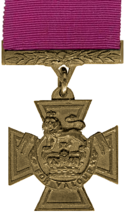This is an old revision of this page, as edited by Yobot (talk | contribs) at 04:56, 5 July 2011 (Updated infobox (BRFA 21) using AWB (7779)). The present address (URL) is a permanent link to this revision, which may differ significantly from the current revision.
Revision as of 04:56, 5 July 2011 by Yobot (talk | contribs) (Updated infobox (BRFA 21) using AWB (7779))(diff) ← Previous revision | Latest revision (diff) | Newer revision → (diff)| Godfrey Meynell | |
|---|---|
 | |
| Born | Meynell Langley, Derbyshire |
| Died | Khyber Pass, North West Frontier, British India |
| Buried | Guides Chapel, Mardan |
| Allegiance | |
| Service | British Indian Army |
| Rank | Captain |
| Unit | 12th Frontier Force Regiment |
| Battles / wars | 1935 Mohmand Campaign |
| Awards | Victoria Cross Military Cross |
| Relations | Hugo Anthony Meynell (son) |
Godfrey Meynell VC MC (30 May 1904 – 29 September 1935) was an English recipient of the Victoria Cross, the highest and most prestigious award for gallantry in the face of the enemy that can be awarded to British and Commonwealth forces.
Background
Meynell was the son of an army officer and won a scholarship to Eton. He was commended to Cyril Connolly when he arrived there as a boy with character. After an initial amount of bullying, the two became firm friends as described in Enemies of Promise. He had passed out thirteenth at Sandhurst before volunteering for the British Indian Army. He was awarded the Military Cross in 1933 for his work in Chitral
Details of award
Godfrey Meynell was thirty-one years old, and a captain in the 5th Battalion (Queen Victoria's Own Corps of Guides), 12th Frontier Force Regiment, British Indian Army during the 1935 Mohmand Campaign in British India. On 29 September 1935 at Mohmand, in the Nahaqi Pass within the Khyber Pass on the North West Frontier, British India (now Pakistan), in the final phase of an attack, Captain Meynell, seeking information on the most forward troops, found them involved in a struggle against an enemy vastly superior in numbers. He at once took command, and with two Lewis guns and about thirty men, maintained a heavy and accurate fire on the advancing enemy, whose overwhelming numbers nevertheless succeeded in reaching the position and putting the Lewis guns out of action. In the hand-to-hand struggle which ensued, Captain Meynell was mortally wounded, but the heavy casualties inflicted on the enemy prevented them from exploiting their success.
Regimental records suggest that when the bodies of his men were mutilated by the enemy (as was their custom), Captain Meynell sought to defend those bodies even as he himself was dying.
Captain Meynell’s Victoria Cross was awarded posthumously, and given to his widow at a ceremony at Buckingham Palace in July 1936. His body is laid to rest at the Guides Chapel in Mardan, near Peshawar in the North West Frontier Province, where he and his wife were married. Captain Meynell and his wife, Sophia Patricia (Jill) Meynell, were both speakers of Urdu. Meynell's son Hugo Anthony Meynell was born six months after the death in the incident for which he was awarded the Victoria Cross.
References
- Cyril Connolly Enemies of Promise Routledge & Kegan Paul 1938
- London Gazette
- London Gazette
- 1904 births
- 1935 deaths
- Old Etonians
- British recipients of the Victoria Cross
- British Indian Army officers
- British Indian Army killed in action
- People from Amber Valley (district)
- Sandhurst graduates
- Corps of Guides (India) officers
- British military personnel of the 1935 Mohmand Campaign
- People from Derbyshire